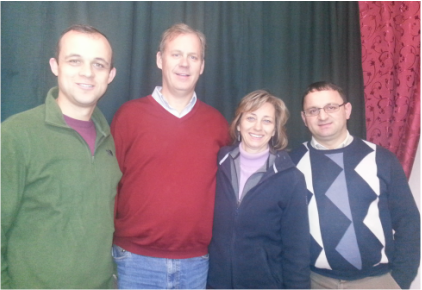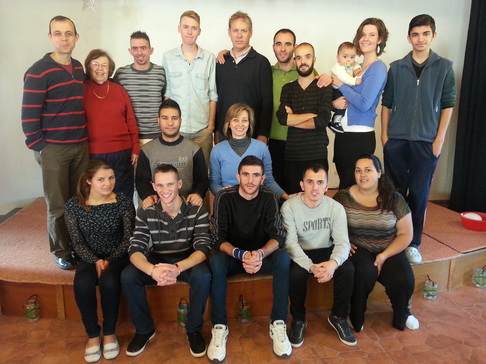 Together with Doni and Asim, our translators at the Bible School in Albania, who are themselves excellent teachers and were our partners in our ministry Together with Doni and Asim, our translators at the Bible School in Albania, who are themselves excellent teachers and were our partners in our ministry Whose crazy idea was it to attempt to teach a public speaking course in a language the instructor doesn’t speak, to students with a range of educational levels from college down to the equivalent of eighth grade? Ah yes, that would be me (Lisa). When we first heard of the Udhekryq Torchbearers School in Erseke, Albania, it was clear what Rich could bring. It is primarily a Bible School for young adults (here’s an introduction to the Torchbearers network of schools around the globe), and Rich offered to take them through the book of Ephesians. I could have prepared another book of the Bible, but was eager to see if my training in communication could be of use, and curious how it would transfer cross-culturally. I crafted a set of assignments and simple lectures to empower them to do each one. First, I asked them to make an announcement for a church service, using good motivational strategies, an element of personal testimony, and a winsome invitation. I then asked them to share their testimony in a longer speech. The third assignment was to teach one aspect of doctrine, a line from the Nicene Creed. We took a break from the seriousness and practiced impromptu speaking by selling each other random strange items, recast as different items. We are wrapping up tomorrow with the task of retelling a story from Scripture from a creative angle. As some of the talks have ended, I have asked my students, “Was that easier than you thought it would be, or harder?” As the time ends, I find myself asking that, with surprising answers. Teaching here has been easier than I’d imagined in some ways, and harder in others: Easier: It was easier than I’d imagined getting them to stretch themselves with some assignments that were really new for them. They were quite game and willing to take risks. Hard: Overcoming the translation challenges was trickier than I’d anticipated. When a translator translated the speeches, the students had a hard time with the interruption. Rich and I are used to it but speakers not used to translation tend to look at the translator too much, wait too long, and lose steam in the gaps. For one speech, the translator stood with them and interrupted throughout. For the next one he sat and whispered loudly to the four English speakers, which proved too distracting to the speakers. For another, he gave a summary at the end of each speech. It was never perfect, but we made it work. Harder: Students in Albania tend to be taught via rote memorization and regurgitation of content, and so meta-level thinking such as evaluating the logical flow or creativity level of a peer’s speech was new to them. Evaluation mostly consisted of stating the content they most liked from each other’s speeches. The requirement to sell each other an object as something different than the object itself was for the most part ignored—they enthusiastically sold the items as they were. Changing an item’s identity required a type of lateral thinking which they are not accustomed to doing. Hardest: The toughest part of this week for me emotionally has taken place during the testimony speeches and around the edges, at mealtimes and on walks. One young man, in his testimony speech, told of being beaten regularly by his brother, a Muslim, as punishment for converting to Christianity. He is heading home for Christmas praying for a good attitude to endure the beatings. One young woman is heartbroken knowing that her parents only allowed her to come for the fall, and she may not be able to return after Christmas to a place that has been so life-giving for her. I took a long walk with a former student who is dealing with the deaths of both parents and the years of neglect and abuse from them while they were alive. “I should have aborted you like my doctor told me to!” was her mother’s constant refrain. It was perhaps most poignant for us to observe a man in his thirties coming to class each morning, diligently taking notes on the teaching but clearly not a student, and to learn that he is a graduate who recently lost his job in town and has no prospects whatsoever. Rampant unemployment is one of the most painful themes of Eastern Europe and Eurasia. From Bishkek to Bulgaria, we hear the laments: our best and brightest young people are leaving, Communism left us unprepared to compete in a global economy, government corruption saps jobs, etc. We see the frustration in people’s eyes, and hear the shame and desperation in their voices as they tell the stories of career aspirations crushed, of training for jobs that don’t materialize, of getting then losing a job, etc. We both know some of their pain as we’ve struggled in this area ourselves the last few years. We wish so much that we could wave a wand and fix it, but all we can do is listen, support, pray, and hope alongside people.
We leave Albania with profound respect for the missionaries and nationals who are pouring themselves out to seek the welfare of this land. We met gifted nurses, teachers, and pastors. We leave sobered by the task that lies ahead for the church, entrepreneurs, and the government to build cultures and systems that will enable people to flourish. And we leave thankful for a chance to invest in a few of those people.
1 Comment
Lisa Ujifusa
1/10/2015 09:46:29 am
Lis - I thought your class exercises were really cool. Very interesting insights on the culture/mindset and touched by the stories you shared of our brothers and sisters struggles. I pray that they can know more of their true identity in Christ and their belovedness.
Reply
Leave a Reply. |
Archives
April 2024
AuthorRich and Lisa Lamb Categories |

 RSS Feed
RSS Feed